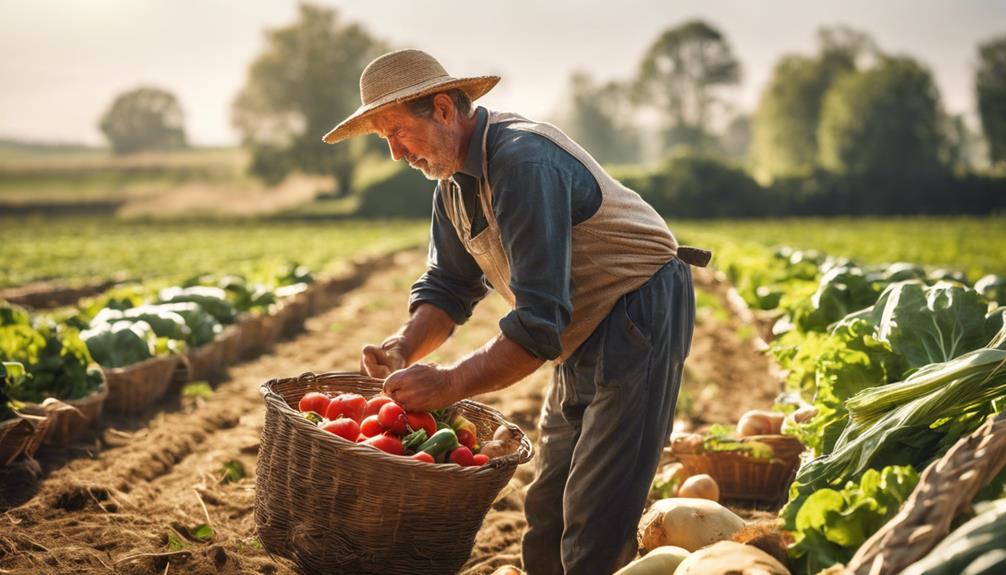Kickstarting Your Journey Into Organic Farming: a Guide
Embarking on the path of organic farming can seem like a daunting endeavor, with a myriad of techniques and practices to navigate. However, with the right knowledge and guidance, you can cultivate your own organic oasis.
From enriching the soil to managing pests naturally, each aspect of organic farming holds its own significance. By understanding the principles behind organic agriculture, you can not only benefit your health and the environment but also create a sustainable future for generations to come.
Benefits of Organic Farming
If you're considering organic farming, you'll appreciate the numerous benefits it offers to both the environment and your health. One of the key advantages of organic farming is its focus on environmental sustainability. By avoiding synthetic pesticides and fertilizers, organic farming helps protect soil quality, reduce water pollution, and promote biodiversity. This sustainable approach ensures that the land remains fertile for future generations, supporting long-term agricultural productivity and ecosystem health.
In addition to environmental sustainability, organic farming also provides significant health benefits. When you choose organic produce, you're opting for food that's grown without harmful chemicals. This means that you can enjoy fruits and vegetables that are free from pesticide residues, making them safer and healthier for you and your family. Organic farming practices also prioritize animal welfare, ensuring that meat, dairy, and eggs come from animals raised in humane conditions without the use of antibiotics or synthetic hormones.
Soil Preparation Techniques
To ensure successful organic farming, mastering effective soil preparation techniques is essential for maximizing crop yields and maintaining soil health. One key practice in organic farming is composting. Composting offers numerous benefits such as enriching the soil with essential nutrients, improving soil structure, and promoting beneficial microbial activity.
To compost effectively, start by layering organic materials like kitchen scraps, yard waste, and manure. Turn the compost regularly to aerate it and speed up decomposition. Over time, the compost will transform into nutrient-rich humus that can be used to feed your crops.
Another valuable technique is mulching. Mulching provides various advantages such as conserving soil moisture, suppressing weeds, and moderating soil temperature. To mulch your crops, apply a layer of organic materials like straw, leaves, or grass clippings around the base of your plants. Make sure the mulch is spread evenly and avoid piling it up against plant stems to prevent rotting.
Pest Management Strategies
Implementing effective pest management strategies is crucial in organic farming to protect crops from potential damage and ensure a successful harvest. To tackle pests in an organic and sustainable way, consider the following strategies:
- Integrated Pest Management (IPM): IPM involves using a combination of biological, cultural, physical, and chemical methods to manage pests effectively while minimizing harm to the environment and human health.
- Beneficial Insects: Encourage the presence of beneficial insects like ladybugs, lacewings, and predatory beetles in your fields. These insects can help control pest populations naturally.
- Crop Diversity: Planting a variety of crops can disrupt pest life cycles and reduce the risk of infestations. Additionally, diverse plantings can attract beneficial insects that prey on pests.
- Natural Predators: Introduce natural predators such as nematodes or parasitic wasps to keep pest populations in check. These predators can help maintain a balanced ecosystem within your farm.
Crop Rotation and Companion Planting
Crop rotation and companion planting play essential roles in organic farming practices, optimizing soil health and pest management for sustainable crop production. By rotating crops seasonally, you can prevent soil depletion and nutrient imbalance, promoting sustainable practices. Different crops have varying nutrient needs, and rotating them helps maintain soil fertility naturally, reducing the reliance on synthetic fertilizers. Additionally, crop rotation disrupts pest life cycles, decreasing the need for chemical pesticides.
Companion planting involves strategically growing different plants together to enhance growth, repel pests, and attract beneficial insects, thus promoting biodiversity. For example, planting marigolds alongside tomatoes can help deter nematodes, while interplanting beans with corn provides mutual benefits as beans enrich the soil with nitrogen, benefiting the corn's growth.
Furthermore, certain plant combinations can enhance flavor profiles and increase overall yield. For instance, planting basil near tomatoes can improve the tomatoes' taste and repel pests that commonly affect them. These sustainable practices not only benefit the crops but also contribute to the overall health of the ecosystem by promoting biodiversity.
Organic Fertilization Methods
Consider incorporating organic fertilization methods into your farming practices to enhance soil fertility naturally and sustainably. Organic fertilization methods not only improve soil health but also promote a more environmentally friendly approach to farming.
Here are some key methods to consider:
- Composting Benefits: Composting is a great way to recycle organic waste from your farm and turn it into nutrient-rich fertilizer. It helps improve soil structure, retains moisture, and enhances nutrient availability for your crops.
- Cover Crops: Planting cover crops during the off-season can help prevent soil erosion, suppress weeds, and add organic matter back into the soil when they're tilled under. This practice improves soil fertility and reduces the need for synthetic fertilizers.
- Crop Residues: Leaving crop residues on the field after harvest can contribute to soil organic matter, which is essential for soil fertility. As these residues decompose, they release nutrients back into the soil, nourishing future crops.
- Green Manure: Green manure involves growing specific plants that are then incorporated back into the soil while still green. This method not only adds organic matter but also fixes nitrogen levels in the soil, reducing the need for external inputs.
Water Conservation Practices
To maximize water efficiency on your organic farm, prioritize implementing sustainable irrigation methods. One effective way to conserve water is through rainwater harvesting. By collecting rainwater in barrels or tanks, you can use it to irrigate your crops during dry spells, reducing the need for groundwater or municipal water sources. This not only conserves water but also reduces your farm's reliance on external water supplies.
Another water conservation technique to consider is drip irrigation. Drip irrigation techniques deliver water directly to the base of plants, minimizing evaporation and runoff compared to traditional sprinkler systems. This method ensures that water reaches the roots where it's needed most, promoting plant growth while using water more efficiently.
When setting up your irrigation system, be sure to design it in a way that maximizes water conservation. Consider using timers to schedule watering during the early morning or late evening when evaporation rates are lower. Additionally, regularly check for leaks or damaged hoses to prevent water wastage.
Harvesting and Storage Tips

Maximize the quality of your harvest by implementing efficient storage practices on your organic farm. When it comes to harvesting and storing your produce, preserving freshness and preventing spoilage should be top priorities. By following sustainable storage techniques, you can minimize waste and ensure that your hard work in the fields pays off in the long run.
Harvesting and Storage Tips:
- Harvest at the Right Time: Pick your crops when they're at their peak ripeness to ensure maximum flavor and nutritional content.
- Proper Handling: Treat your produce with care to avoid bruising or damage that can lead to spoilage.
- Utilize Appropriate Storage Containers: Use breathable containers or bags to maintain the right level of humidity and prevent mold growth.
- Monitor and Rotate Stock: Regularly check your stored produce for any signs of spoilage and rotate older stock to the front for use first.
Certification and Regulations
When certifying your organic farm, ensure compliance with the regulations set by the governing bodies to maintain the integrity of your products. Certification is crucial as it not only validates your farming practices but also opens up market access by meeting the standards that consumers trust. By obtaining organic certification, you tap into a growing consumer demand for organically produced goods, giving your products a competitive edge in the market.
Organic farming regulations are in place to ensure that your farm follows specific guidelines regarding soil health, pest management, use of chemicals, and overall sustainability. These regulations are designed to protect the environment, wildlife, and consumers from harmful practices that conventional farming may employ. By adhering to these regulations, you demonstrate your commitment to producing high-quality organic products that meet the expectations of conscious consumers.
Achieving certification may involve inspections, documentation, and fees, but the benefits far outweigh the initial investment. Organic certification not only allows you to label your products as organic but also provides credibility and trust among consumers. This trust is invaluable in today's market where more and more people are seeking out organic options. By certifying your farm, you position yourself to meet consumer demand and access markets that prioritize organic products, ultimately paving the way for a successful organic farming venture.
Frequently Asked Questions
How Can I Find Affordable Land to Start My Organic Farm?
To find affordable land for your organic farm, start by exploring different financing options. Look into agricultural loans or grants that could help you secure the necessary funds.
Research land availability in rural areas where prices might be lower. Check zoning laws and regulations to ensure the land is suitable for farming.
With careful planning and thorough research, you can find a piece of land that fits your budget and meets your organic farming needs.
What Are Some Challenges Specific to Organic Farming That I Should Be Prepared For?
When diving into organic farming, be ready for unique challenges. Pest management can be tricky without conventional pesticides.
Soil fertility maintenance is key for healthy crops. Navigating the organic certification process demands time and paperwork.
Marketing organic products requires education and outreach to attract customers. Stay informed, plan ahead, and be proactive in addressing these hurdles to set yourself up for success in the organic farming journey.
What Resources Are Available for Learning About Sustainable Farming Practices?
If you're looking to learn about sustainable farming practices, you have a plethora of resources at your disposal. Online courses, workshops, and hands-on training can provide valuable knowledge.
Mentorship programs, webinars, and networking events offer guidance and support. Explore sustainable agriculture conferences, government resources, and educational materials for further insight.
Engage with community gardens, local farms, and agricultural extension services to deepen your understanding. The world of sustainable farming is rich with opportunities for growth and learning.
How Can I Market My Organic Products Effectively to Reach a Wider Audience?
To market your organic products effectively and reach a wider audience, consider leveraging social media platforms for promotion. Engage with potential customers, share your farm's story, and showcase your products through captivating visuals.
Additionally, explore selling at farmers markets to connect with local consumers who appreciate organic goods. By combining online presence with in-person interactions, you can increase visibility and attract a broader customer base for your organic products.
Are There Any Grants or Funding Options Available for New Organic Farmers?
Yes, there are grants and funding options available for new organic farmers. Government grants and private funding opportunities can provide financial support to help you kickstart your organic farming journey.
Research governmental agricultural programs and private organizations that support sustainable agriculture to find the best funding options for your organic farm. Make sure to meet all application requirements and deadlines to secure the financial assistance you need.
Conclusion
Now that you have a better understanding of organic farming practices, it's time to put your knowledge into action.
Start by preparing your soil, implementing pest management strategies, and utilizing organic fertilization methods. Remember to rotate your crops and consider companion planting for optimal results.
Practice water conservation techniques and follow harvesting and storage tips. Stay informed about certification and regulations to ensure your farm meets organic standards.
Good luck on your organic farming journey!
